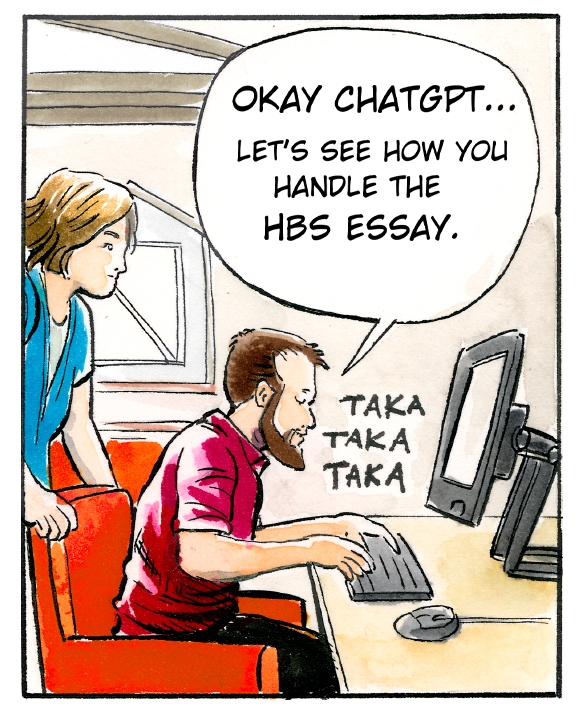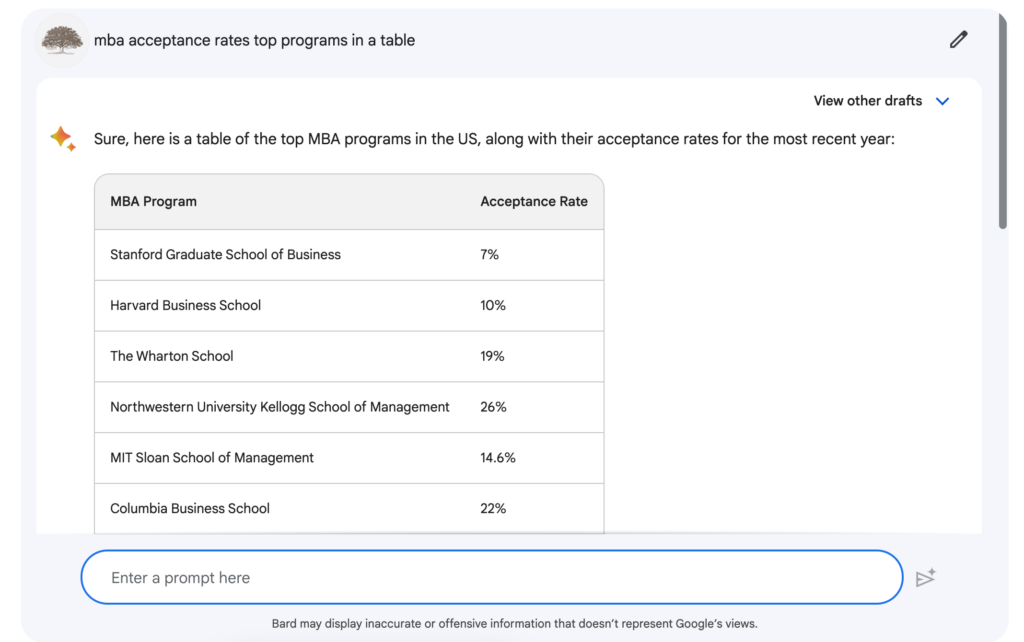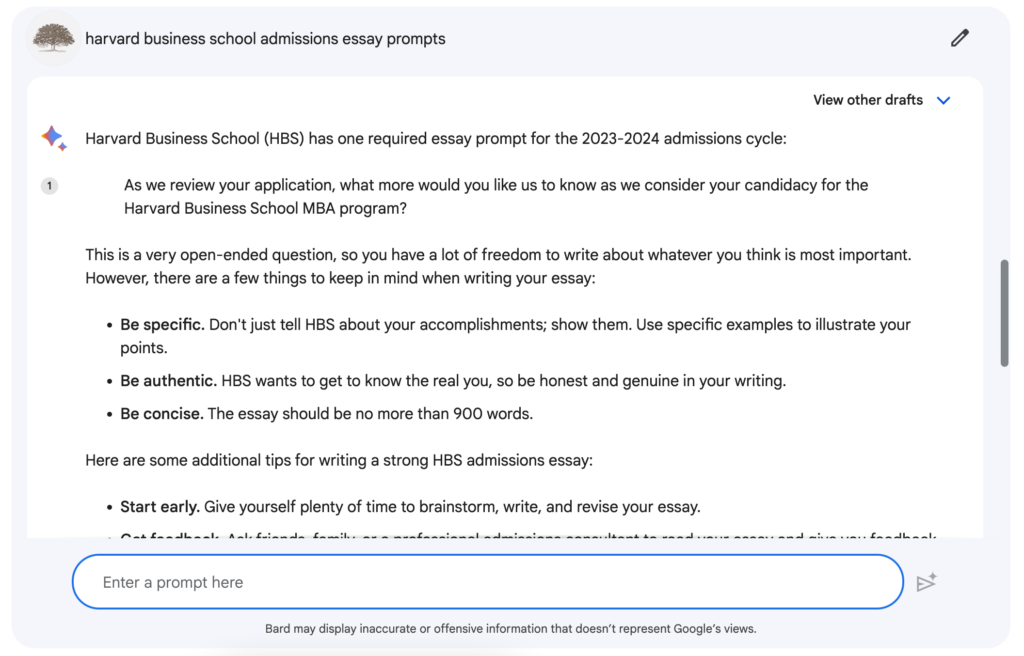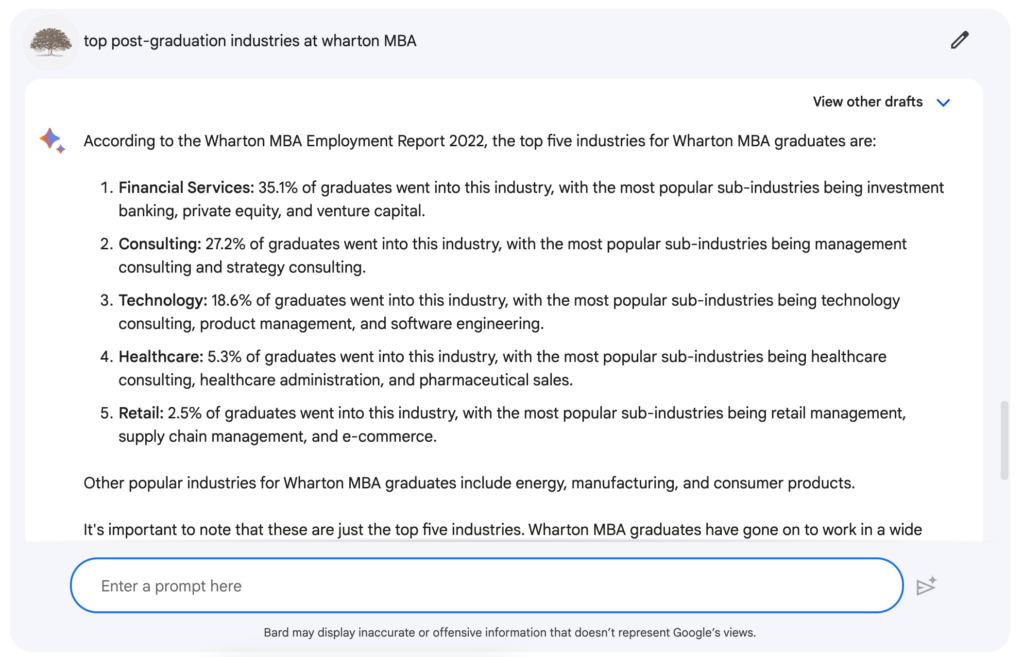The impact of ChatGPT and other AI tools on all domains, including MBA admissions, is indisputable. Unsurprisingly, one of the most natural and commonly asked questions on AI is in regard to MBA essay writing. But can AI really help you write a better essay—and more importantly, is using AI to help you write your MBA essays actually allowed?
In this article, we discuss how business schools are responding to AI-based text generative technology by adding explicit policies to their applications and school handbooks. Then we’ll discuss whether or not you’ll want to use AI at all for your MBA applications.

Not all schools have clear policies on the use of AI in the admissions process as of yet, but some programs have already made their boundaries clear. As schools adjust their policies, this page will be updated, so please check back frequently.
Columbia Business School requires that the work contained in your application (including essays) is completely accurate and exclusively your own. Columbia University permits the use of generative AI tools for idea generation and/or to edit a candidate’s work; however, using these tools to generate complete responses violates the Honor Code.
Offers of admission will be rescinded should any misrepresentation and/or omission occur.
(Source)
While not explicitly aimed at MBA applicants, this policy from the HBS student handbook is instructive:
Faculty may allow the use of ChatGPT and similar technologies in some circumstances (please clarify with your faculty if you have any questions about use). These tools can support learning, and they hold significant promise, so we are eager for students to acquire expertise in their use. As you develop that expertise, please be aware of their limits and apply best practices to their use:
(Source)
- The quality of your prompts will determine the quality of the results. If you provide low-quality prompts, you will get low-quality results. You will need to practice generating and refining your prompts, including follow-up prompts, in order to get good outcomes.
- Assume data and facts provided by the tool are false unless you can confirm them with another source. These tools cannot presently reliably guarantee the truth of the results they provide, and you are responsible for the accuracy of your answers. Treat these tools just as you would another unreliable but thought-provoking source.
- As clarified in our citation guide (pdf), you must cite your use of these tools appropriately. Not doing so violates the HBS Honor Code, just as would failing to cite any other source.
Keeping in mind the different policies of MBA programs, here are two areas where AI tools might actually help you during the application process.
Naturally, ChatGPT and other AI tools can be used to quickly provide relevant information about top business schools and their programs. AI tools can pull data from school websites, including admission requirements, class profiles, and employment outcomes, to help you determine which program is the best fit for you.
In fact, AI-powered search is already underway at Google and Bing. For example, Google’s Bard, a generative AI chatbot, will soon be incorporated into basic Google search.
For many fact-based queries, users will see Bard’s output ahead of third-party results. We tested Bard on common MBA queries, and found that it was able to produce accurate and useful information on basic MBA questions.



As with any AI tool, you should proceed with caution (note that Bard is still in the experiment phase, and all results have the disclaimer: “Bard may display inaccurate information”). Still, for quick searches and useful intelligence gathering, Bard will be a welcome search partner for applicants trying to orient themselves in the MBA landscape.
Remember to carefully review and verify the data you gather using generative AI tools. School websites remain the most authoritative sources of detailed program information.
AI text generation tools like ChatGPT can help you edit your essay—but not in the way you’d think.
Recently, English computer scientist and venture capitalist Paul Graham shared an unconventional idea for essay editing on Twitter.
He writes:
“Noticed something fascinating(ly digusting) about AI-generated summaries of essays: they don’t just make them shorter, but also make the ideas more conventional. Which makes sense given the way the AIs are trained. Hypothesis: the better an essay, the worse it will compress, at least with current AI. So there’s a novel way to use AI. Try asking it to summarize a draft of an essay. If the result is anything like the original, the essay is bad.”
@paulg
Paul is getting at a fundamental problem with text generated by AI: it is highly articulate but generic, grammatically perfect but uninspired.
Specifically, in reviewing ChatGPT output for more substantial writing tasks, we’ve noted a few common problems with the results:
From our point of view then, AI can do very little for you in terms of essay writing (with the exception, perhaps, of telling you that your essay needs more work).
Apply for a free consultation call with our expert MBA admissions consultants.
Apply for a free consultation call with our expert MBA admissions consultants.
MBA applicants aren’t the only people curious about the use of AI in business school—some prominent professors have also tested the potential of ChatGPT, literally. The results were mixed.
For example, Christian Terwiesch, the Andrew M. Heller Professor at the Wharton School of the University of Pennsylvania, had ChatGPT take his final exam. The tool scored a B to B-, which took the professor by surprise. He commented that he would still allow students to make use of the tool, but that educators would need to rethink essay writing and education as a whole.
On the other hand, Johan Hombert, professor of Finance at HEC, who also had AI take his exam, reported a less remarkable outcome. According to Johan, ChatGPT achieved a rather underwhelming score of 20%, significantly lower compared to the average score of his students, which was 73%. It is worth noting that even a random selection of answers would result in a 30% accuracy rate.
As AI technologies continue to evolve, business schools are developing and refining their policies on the use of AI in MBA admissions. Applicants should familiarize themselves with the specific policies of their target schools and utilize AI tools responsibly, recognizing their potential benefits and limitations. Ultimately, the human element, including originality, authenticity, and introspection, remains crucial in the MBA application process.
Stay informed about how business schools are adapting to new technologies with insights from our knowledgeable MBA consulting team.